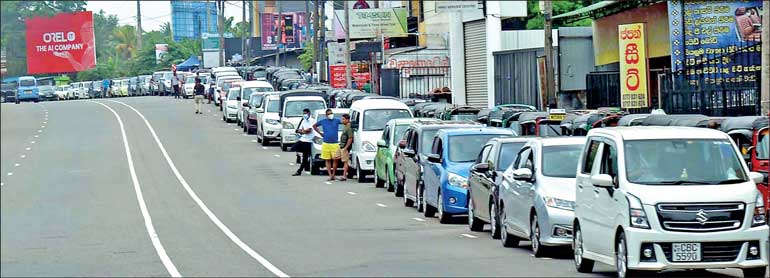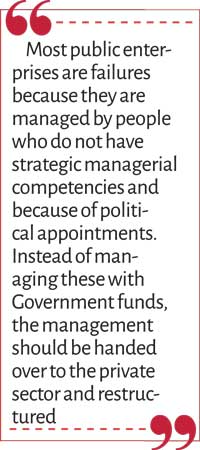Monday Mar 02, 2026
Monday Mar 02, 2026
Wednesday, 15 June 2022 00:15 - - {{hitsCtrl.values.hits}}

During the 16th to 18th century, the economic theory of mercantilism said that one country’s surplus case was another country’s loss. At that time, England was the epicentre of the British Empire. But that paradigm of economics shifted with Adam Smith’s theory of “Laissez-Fare”. Again the Laissez-Fare policy could not solve the great depression during 1929-1930 and the economy could not come to equilibrium until the Keynesian theory of government intervention through fiscal policy that increased the aggregate demand. At that time global GDP declined by -26.7% and global unemployment increased by 24.9%. As in the mercantilism theory, Sri Lanka has a big loss of dollars due to unbelievable outflows.
economics shifted with Adam Smith’s theory of “Laissez-Fare”. Again the Laissez-Fare policy could not solve the great depression during 1929-1930 and the economy could not come to equilibrium until the Keynesian theory of government intervention through fiscal policy that increased the aggregate demand. At that time global GDP declined by -26.7% and global unemployment increased by 24.9%. As in the mercantilism theory, Sri Lanka has a big loss of dollars due to unbelievable outflows.
What will be the economic theory that explains the current situation and applicable theory of economics and solution? Indigenous growth theory can be applied because that theory explains the appropriate government policies can permanently raise a country’s growth rate particularly if they lead to a higher level of competition in markets and a higher rate of innovation improvements in productivity can be linked to a faster pace of innovation and extra investment in human capital. This theory has emphasised positive externalities and spill-over effects from development of a high valued-added knowledge economy.
There are potential increasing returns from higher levels of capital investment private investment in R&D is the central source of technical progress. Protection of property rights and patents can provide the incentive to engage in R&D investment in human capital, education and training of the workforce is an essential ingredient of growth.
In 2021 alone we lost $ 5 billion from tourism and foreign remittances, the two areas from which we obtain the highest revenue. And also no receiving income from huge projects those invested through foreign loans with higher interest rates. At a time of economic crisis, it is essential to control expenditure and expand sources of income. As shown in figure 2 in first part, it is necessary to strengthen all avenues of international sources of revenue while reducing the outflow and control the Government expenditure. There are several strategies for this.
Control of Government expenditure
The great depression period has promoted more Government expenditure to increase demand. The current situation demand is high but supply is low especially on imported goods as well as some essential goods. All expenditure must be monitored while all channels of outflows of foreign exchange must be controlled. We have been caught in a debt trap knowingly or unknowingly and we have not invested the borrowed money usefully resulting in a long-term financial crisis. As a result we have to pay 110% of GDP for repaying loans. In order to reduce this ratio we must improve the GDP or reduce the loan payments or there should be a change in these two. In order to reduce the loan component the Government needs to continually discuss repayments with lenders and with the help of the IMF renegotiate to revise the loans. The Government is already at discussions and we need the cooperation of the lender until our dollar inflow and our income is restored. 
We have to seek every means to get out of the debt trap and from seeking further loans to repay the current loans and seek frugality in living. The Government’s policy of limiting the import of luxury goods and the import of motor vehicles are far seeing policies. However by cutting off expenses for inputs in production and industry and agriculture and export industry more harm can be created for the economy. These essential expenses have to be borne. Every measure must be taken to protect industries dependent on imports, and export-oriented industries must be safeguarded while expenditure for import is strictly monitored. Self-sufficient or semi self-sufficient villages do not feel a great impact but it is the urban that are dependent on imports that feel it more. It is therefore necessary to have a scheme to bring relief to middle/lower income groups.
Productivity of Government services
There is a large public service in our country and most of the recurrent expenditure goes towards its upkeep. With 1.1 million Government servants, more than 800,000 three-wheel drivers and 360,000 unemployed, there are 26% of the employable population not contributing to productivity. Even though these services are needed for a country, at a time when the country is ridden with debt, and when the needed skilled workers are absent, this is unacceptable. What should be the alternatives? No one should lose his employment. Government servants should be encouraged to seek other employment in areas they prefer, SMEs or seek overseas employment on long leave or leave altogether with compensation.
For school leavers skilled training should be given so that they will be employable local or overseas rather than begin driving three-wheelers. Redeploying three-wheeler drivers in to the productive sectors should be different ways such as for current drivers, full or part-time training should be available and with new skills they will be gainfully employed. While there are short training programs for three-wheeler drivers, at the moment, these should be published and popularised. And also improve professionalism toward tourist taxi drivers will be value addition to them.
Public enterprises
Most public enterprises are failures because they are managed by people who do not have strategic managerial competencies and because of political appointments. Instead of managing these with Government funds, the management should be handed over to the private sector and restructured.
Use of luxury vehicles and fuel conservation
Luxury vehicles need not be used by Government servants. These vehicles are high on fuel consumption and on maintenance. We need to follow the example of India and similar countries. We must sell off luxury vehicles to countries that have fuel and use vehicles which are cost-effective. Further, most developed countries use bicycles and electric cars for short trips thus saving fuel and being environmentally friendly. The use of bicycles is a good alternative and also it is healthy and needs some road arrangement for safety.
The black economy
At present, Sri Lanka has a big black economy. The import and consumption of dangerous drugs and Kansa causes a loss in foreign exchange of around $ 2.5 billion per year and the rehabilitation of drugs addicts is a huge burden to the society. There is also the smuggling of drugs and their destruction when caught, exchange flows out for this as well. The country will benefit if the illegal import of drugs is stopped and the export of herbal Kansa is legitimised. Further instead of Haval and mundial, etc. exchange methods people must be encouraged to turn to legitimate processes. Until the crisis is over, private moneychanger services need to be controlled and the banking system must be given all opportunities to widen its service resulting in the national system of obtaining foreign exchange.
Limiting foreign exchange for foreign education
Our country has a sound system of education. However because of the limitations to admissions in higher education institutes many leave the country to follow graduate and post graduate courses in medical, engineering and management subjects. Some local institutes enter into partnerships with overseas organisations enabling candidates to qualify here but spend foreign currencies mostly to obtain a branded name of foreign certificate.
While there are qualified capable lecturers here and with all the resources within the country, we send remittances to other countries, sometime lower in rank (Bangladesh) than Sri Lanka. Such syllabuses can be started here by a private-public partnership. Students go to Bangladesh for medical degrees because there is no suitable educational environment for them here. The establishment of NSBM is laudable but we must make Sri Lanka the hub for international education.
Political stability and public sector efficiency
Our economy can be stabilised quickly by conserving foreign exchange as explained and in addition by strictly monitoring expenditure. Yet until political stability is attained, economic stability is unattainable. The desire of the people is to establish again a country free of corruption and debt. The most developed countries in the world such as Northern Europe, Japan and Singapore have very high corruption-free standards. But Sri Lanka’s corruption perception index is 102 out of 178 because of our myopic, undisciplined political system on which governmental policy is built, encouraging dishonest ways that are employed to admit a child to school and so a child begins with corruption and dishonesty. Since corruption leads to leakage of public money it is badly affecting the economic system. All leaders should be corruption-free and need to support and inculcate a corruption-free society.
The maintenance of local government institutions and their expenditure
The State political administrative system has come to be wasteful. The provincial council and local government system was thrust upon us and in comparison to the expenditure it does not show adequate results. The Government’s recurrent expenditure has increased heavily owing to the maintenance of the various Government institutions such as district secretariats, provincial secretariats, provincial councils, regional councils and grama niladhari divisions.
Government’s recurrent expenditure has increased heavily owing to the maintenance of the various Government institutions such as district secretariats, provincial secretariats, provincial councils, regional councils and grama niladhari divisions.
In 2017 the Government spent a colossal Rs. 286,031 million on provincial councils and most of the expenses were for salaries and maintenance (90%), while only a small fraction was spent on development and services to the people. What is the justification for such a provincial system when our country is not even comparable to a section of a state government in India? This system must be abolished and at best we could have the three old zones of Ruhunu, Maya and Pihiti.
Our country which is 25,000 km2 has 9,370 elected representatives. 225 in Parliament, 455 provincial council members, and 8,690 in other local bodies. Consider the expenses, salaries, transport pensions and the maintenance of secretariats. It was observed that when a regional council is dissolved income has increased. Further billions of rupees have been saved after dissolving the provincial council since last three years and no negative impact reported so far. Therefore it is timely that we reduce the number of representatives and cut down inessential expenditure. Further the country spends on four elections in five years. It is necessary to reduce the number of elections too.
It is proposed that all who wish to enter politics must adhere to eligibility qualification criteria. They also should be put through a course in right conduct and procedure by an institute like the Sri Lanka Foundation Institute. In order that this crisis will not lead to a further crisis, all should unite to strengthen the existing procedure. Long-term economic plans for the country should be drafted by competent persons and the National Policy Planning Ministry has a big responsibility on this task. Even though elected representatives change every five years, policies and long-time plans should not change accordingly. The best examples are India and other successful countries.
Sri Lanka hasn’t such a macroeconomic policy, land utilisation policy, or housing policy. The task of the politicians should be to efficiently implement policies. Most experts are of the opinion that politicians think they must only work during their tenure and because of this development slows down. Therefore any government that comes into power must envision a long-term macro-economic plan and policies in order to come out of the crisis.
International experience
The famous story of Singapore which was a fisheries harbour with no water or necessary resource for living is a good example to us. In 1960s Lee Kuan Yew had a dream of Singapore wanting to be a country like Sri Lanka. It has now become the most developed country through its visionary leadership, better investment of human capital and peoples’ comm. Rebuilding Japan and Vietnam after the Second World War was due to great leadership as well as because of each and every individual’s work toward national targets. We do not need to become a Singapore or Japan. Sri Lanka has more strengths, but it should appoint a real person to inaugurate a real, stable, capable and disciplinary government. By examining the factors stated and adopting suitable measures of implementation, no doubt Sri Lanka could overcome the crisis and hold its head up as a proud nation.
The way forward
Taken as a whole, one could summarise the recommendations into short, medium and long term for purpose of implementing for a better economic outcome and to overcome the crisis. Establish political stability through all political parties collectively without hidden agenda and inculcate a peaceful environment. Holistic approach to strengthening the tourism sector through improving international marketing, facilities, encouraging, a green environment and developing quality hospitality workforce is most important. If assume the political stable could be target around $ 5 billion.
Furthermore, we need to think differently to earn foreign exchange through the IT industry, BPM, BPOs and those will be the most effective and possible to earn $ 2 billion. On the other hand some developed countries and INGOs are willing to help Sri Lanka under this difficult situation through providing development grants, research grants and some other project grants. Government institutes, universities and community organisations should apply for such grants instead to the loan could be targeted around $ 1 billion.
Stop black economic supportive activities, illegal imports and unfavourable transactions of hawala mundial, etc., limiting their powers to expand in whole over the country will save billions of dollars. Foreign employment will be the most effective way of earning foreign exchange and should have national priorities to training the workforce, improve foreign language proficiency targeting higher demands and higher salaried jobs. It has an increasing trend and can earn around $ 9 billion. Make available diversified higher education opportunities to control the outflow of forex through the Sri Lankan students engaged in foreign education will be able to save a considerable amount.
Reduce wastage and underutilisation human and physical resource among all national, provincial and local governments. If it’s better to reduce members by 50% out of 9,000 existing seats and restructuring to establish a more efficient system, it should be done. Specially we must reduce the number of provincial councils or merge provincial councils with central government agencies, regional council must be merged with divisional secretariat offices. Make available foreign jobs, SMEs and private sector opportunities to reduce the numbers of public servants.
Encouragement has to be given for each and every piece of land to be used to increase export agriculture and self-sufficiency and increase export-oriented and import subsidy manufacturing. The country should change the foreign loan dependency investment model into local fund investment models, start and promote joint ventures with international funding individuals/organisations as well as get the foreign grants. Promote more investment on renewable power generation projects such as solar, wind, and mini hydro power, etc. and improve efficient power usage transport such as electric cars, bicycle and electric taxis, etc. Government should stop expending for inefficient public enterprises; those must be restructured, and privatise the management.
Due to the shortage of dollars, the import goods are automatically restricted. There is a high value added to local product and the promotion of local products needs to be done urgently.
All these series of recommendations will ensure to earn more than $ 22 billion and be followed by increase in foreign reserves in the near future. Finally, political stability, economic policies, those based on relevant economic theories and strategies mentioned above, will be the most viable solutions to overcome the current economic crisis.

Part 1 of this column can be accessed online at https://www. ft.lk/columns/A-challenge-to-thecurrent- economic-crisis-Foundation- for-a-secure-robust-economy- Part-1/4-735814
(The writer is the Director General of TVEC and former Director of National Human Resource Development Council.)